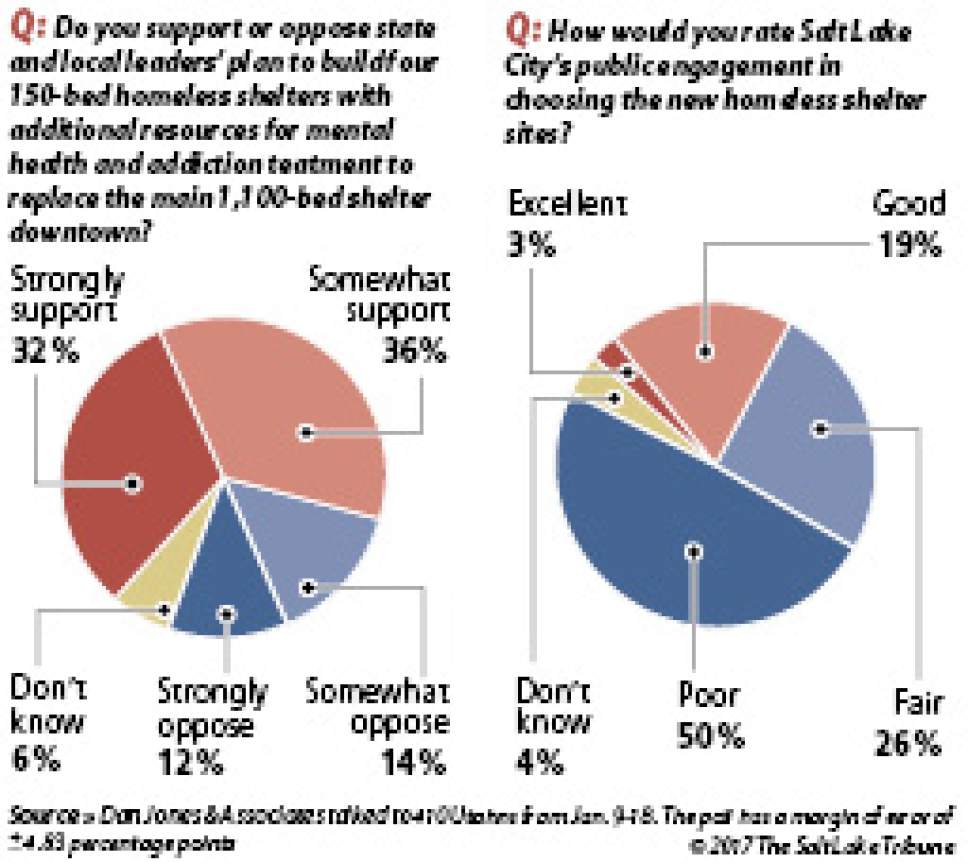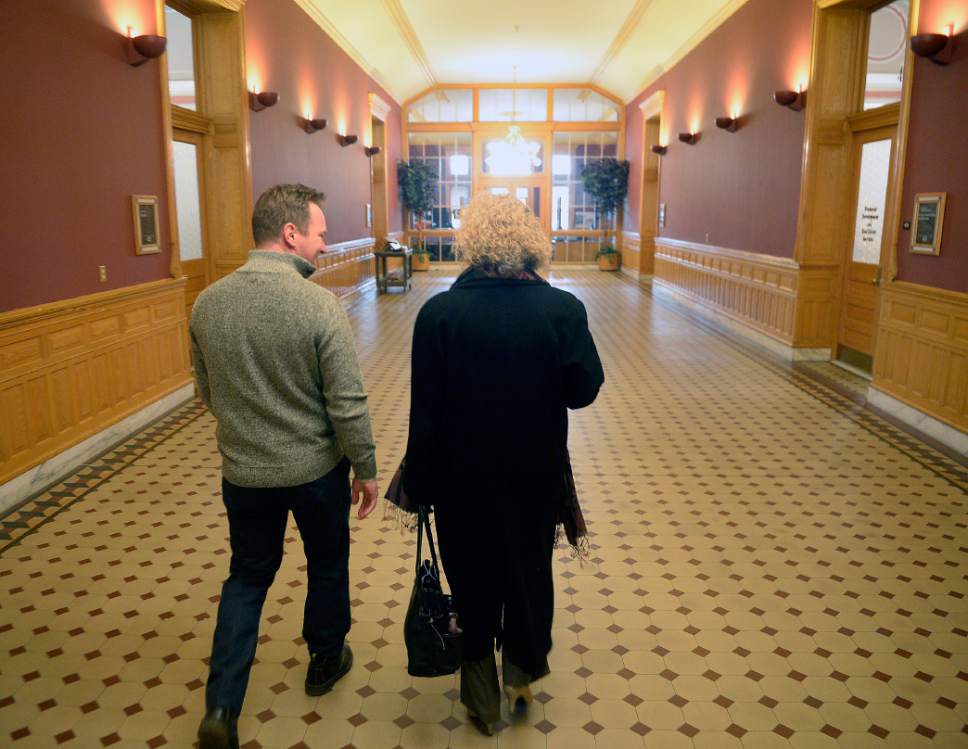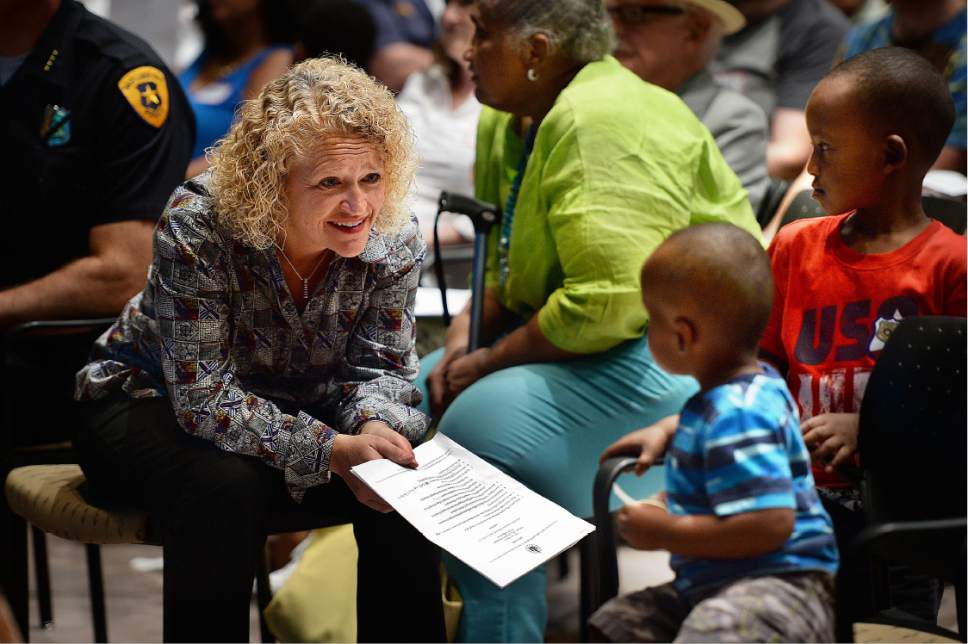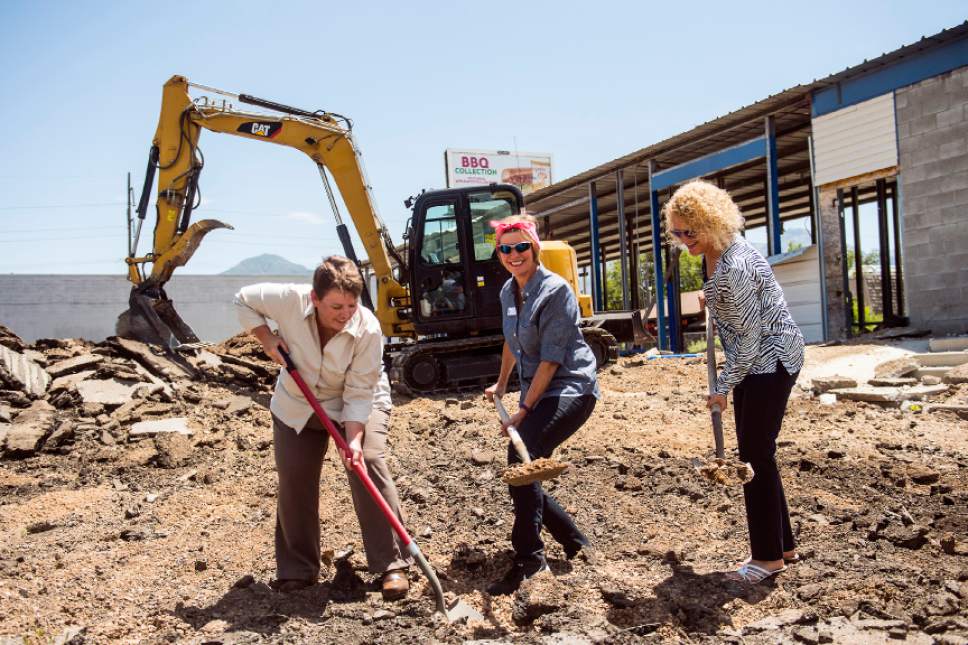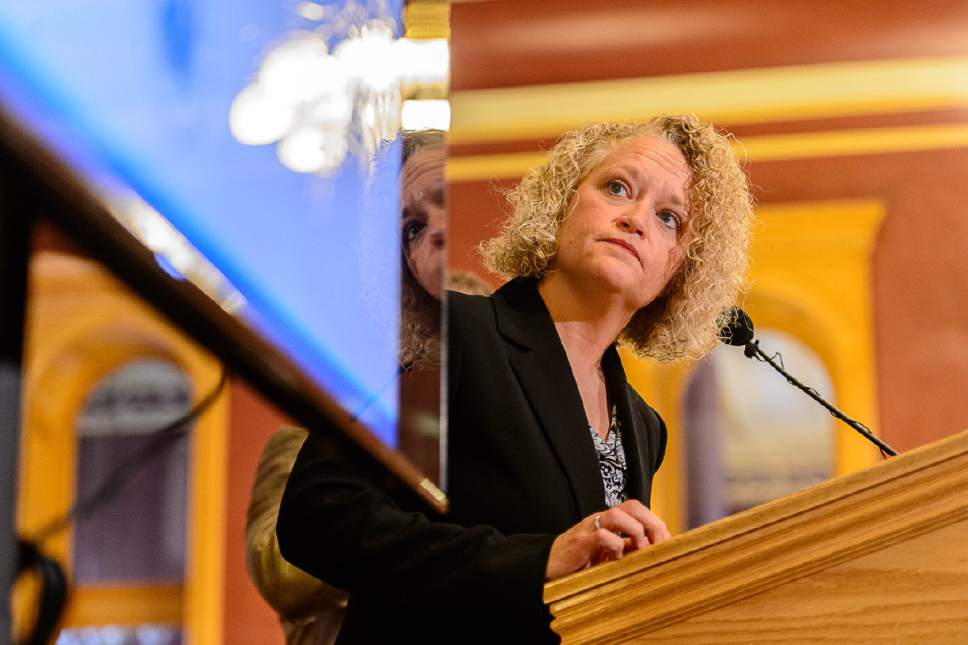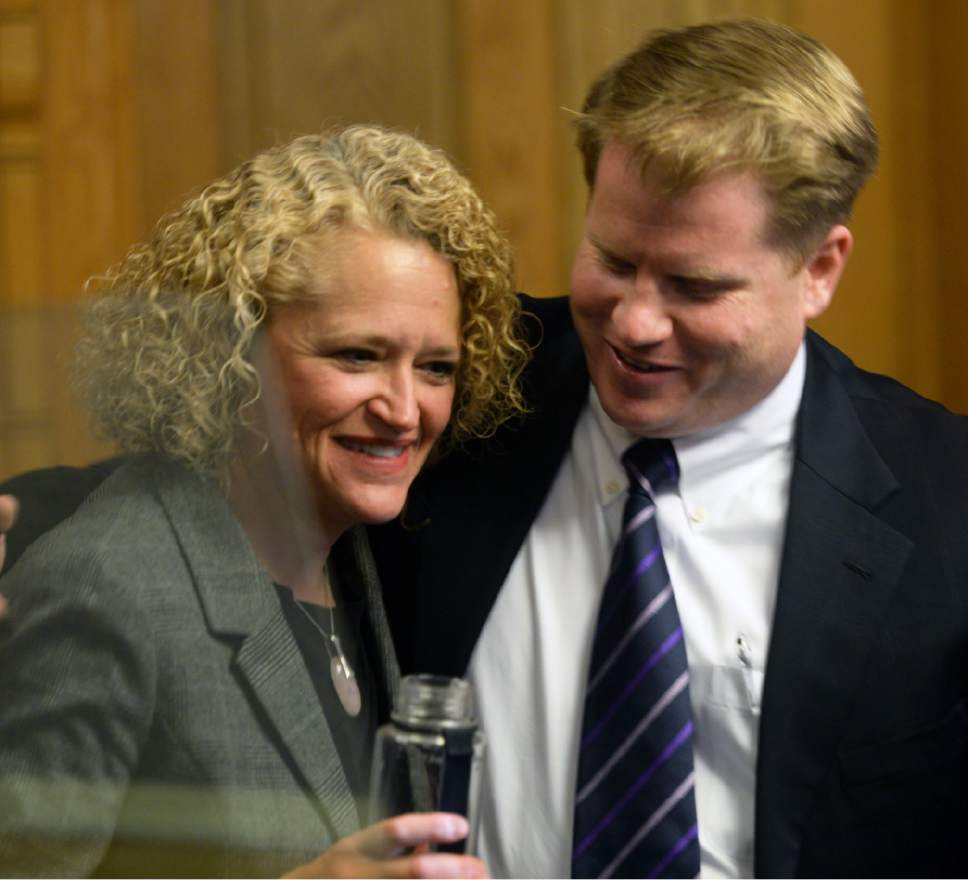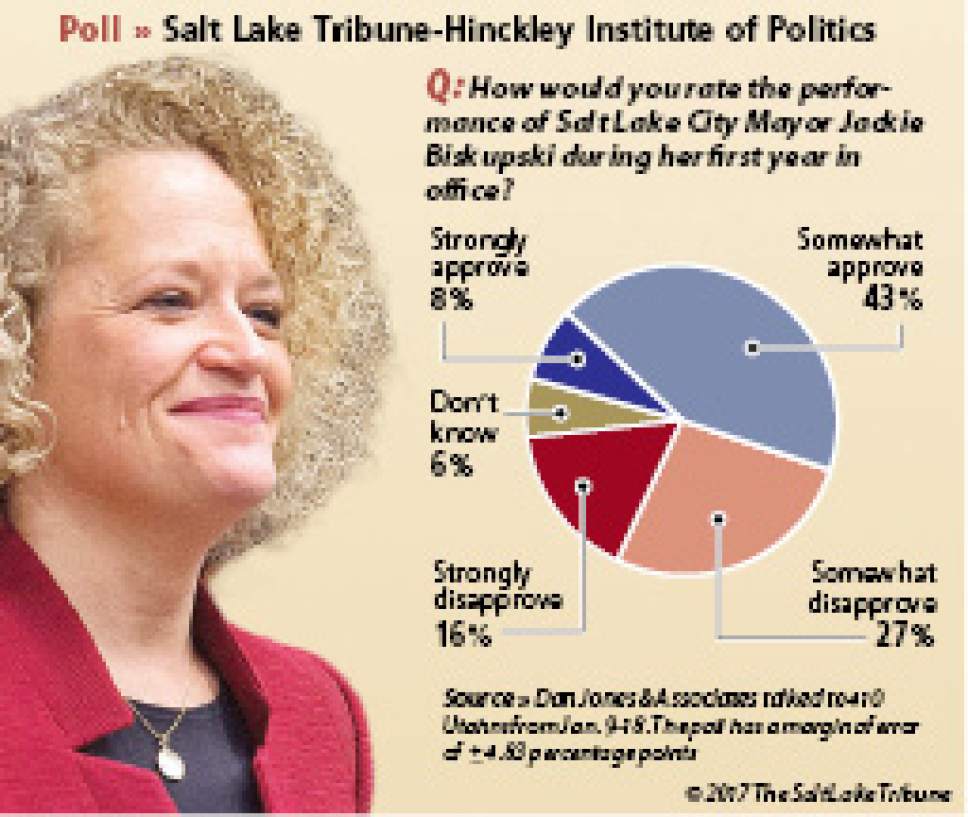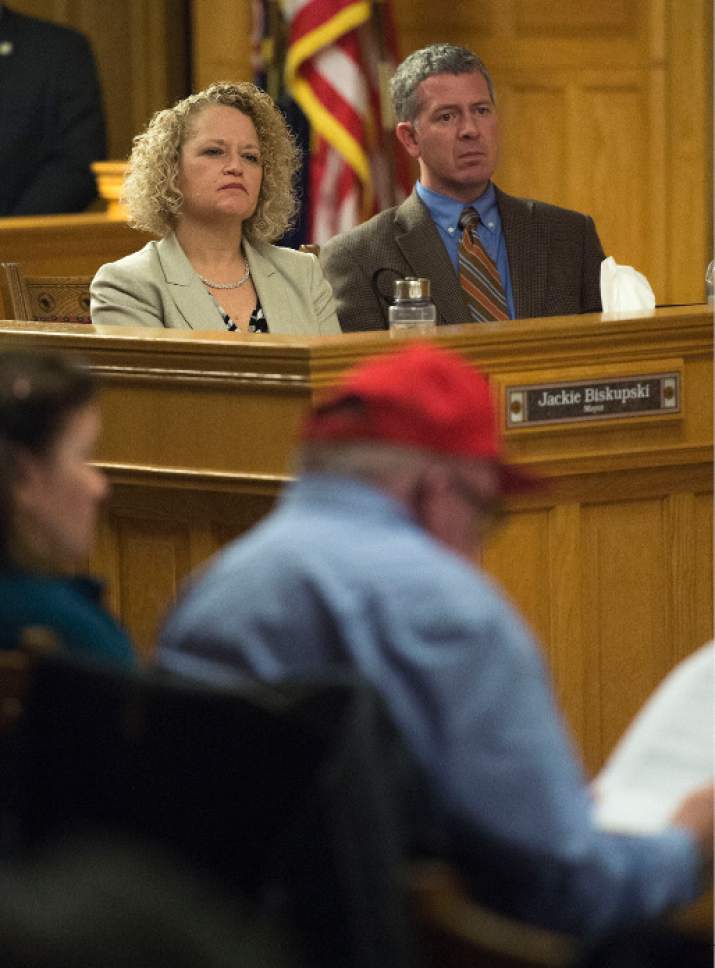This is an archived article that was published on sltrib.com in 2017, and information in the article may be outdated. It is provided only for personal research purposes and may not be reprinted.
Despite the sustained uproar since her mid-December selection of four homeless shelter sites, Mayor Jackie Biskupski enjoys the approval of just more than half of Salt Lake City's registered voters after a year in office.
Biskupski recently sat through two-and-a-half hours of public comment as virtually all speakers condemned her decision to build a 150-bed shelter in a Sugar House neighborhood. But in a new Salt Lake Tribune-Hinckley Institute poll, 51 percent said the former state representative has passed muster as mayor — even though a similar number felt the city did a poor job courting public input on shelter locations.
The poll was conducted among 410 capital city residents by Dan Jones & Associates from Jan. 9 to Jan. 18 and has a margin of error of 5 percent.
"I am pleased," Biskupski said of the results. "We spent our entire year really setting the groundwork to change many big things. I've only lost one percentage point on pushing for change. I think that's a good thing."
Biskupski, who last November edged two-term Mayor Ralph Becker 52 percent to 48 percent, said she has either accomplished or is "moving forward" toward the goals she laid out in her first State of the City address.
Those include, she said: securing the first installment of an expected $27 million in state homeless shelter funding, revamping 911 services, engaging community members after the officer-involved shooting of a 17-year-old Somali refugee and realigning the city's economic-development staff.
Biskupski's majority support was nonetheless unexpected by some on the seven-member City Council. Council members have frequently accused Biskupski of being reluctant to communicate and slow to act on a range of issues from homelessness to affordable housing and impact fees.
Council chairperson Stan Penfold said the upcoming year will bring "some really, really difficult conversations. ... I think it's going to get increasingly challenging."
"I don't think that 51 percent of the council members are thrilled with her," Councilman Derek Kitchen said. "Generally speaking, she came into office without a clear vision, so it's been really hard for us."
Lisa Adams, whose district includes the controversial Sugar House shelter site at 653 E. Simpson Ave. said of the majority support: "It's surprising to me. I really wonder how closely people are following things."
First-term Council member Andrew Johnston was more complimentary.
"After everything we've been through," he said. "It's pretty impressive."
Council member Erin Mendenhall said she was heartened at least that city residents showed faith in their leaders on what was a tearful presidential Inauguration Day for some neighbors — even if Mendenhall has been critical of Biskupski.
"No matter where my ranking would have fallen on those ladders, it does not matter, because what I feel encouraged by is that this poll shows that our community has hope and sees potential for positive growth in the city, even in this hardest of times."
Small business owner Eric Flynn said he was among those who helped Biskupski unseat Becker and that the site selection is her "Obamacare moment" — a big change that required political collateral.
"Something had to be done, because if you go downtown to the Rio Grande district, honestly, it looks like a refugee camp," Flynn said.
Retiree Lawrence Medina agreed.
Becker "dumped it on her lap," he said, and "she has to mop up the mess."
Some poll participants who agreed to speak with The Salt Lake Tribune were aggrieved that Biskupski didn't know about the $7 million pricetag when the city finalized the Simpson Avenue site deal. Biskupski was visiting her ailing father as Chief of Staff Patrick Leary — the day before the site announcements — signed the contract in her stead. Salt Lake County Mayor Ben McAdams has said he expected sites to cost between $1 million and $2 million and that the city would not be fully reimbursed for its purchase.
Others poll participants questioned Biskupski's call to close The Road Home's emergency shelter at 210 S. Rio Grande as soon as the four smaller shelters come online. The Rio Grande shelter has about 1,100 beds, while the four new shelters would offer half that. City and county leaders have said the more intimate, resource-oriented shelters, in tandem with a rethought services model, will reduce demand.
More than two-thirds of the city's voters still support the overall plan.
"They believe we are moving in the right direction," Biskupski said. "I appreciate that support, because no mayor has ever taken this on in the past, and it's not easy."
Some voters who disapproved of Biskupski's performance felt it was ill-advised to begin her tenure by asking all top-level employees to resign.
Said Julie Lundberg, who lives in unincorporated Emigration Canyon: "I understand her interest in expediency, but right out of the blocks, I thought that was a bad first move."
Kim Caramelli said a clean slate may be common practice at other levels of government, "but it's something I was a little unaccustomed to, and I thought it was a little bit dicey for our city."
Caramelli said she voted for Biskupski in part because she felt Becker operated behind closed doors, without a care beyond his own personal agendas. Biskupski pledged to do otherwise, Caramelli said, and has come up short.
"I'm not disgruntled with her necessarily as mayor," she said. "I don't disagree with the plan for the homeless shelters. I just feel like it's like, 'Hey, this is what I'm going to do, and I'm not really interested in hearing from you.'"
Matthew Weilenmann said he too voted for Biskupski, sending her "a really nice email" after she took office. It was a hint of things to come, he said, that he never got a reply.
The mayor and council members met in private last November to narrow shelter finalists to four that leaders announced as set in stone. Half of Salt Lake City voters rated the city's engagement on the shelter sites as "poor," compared to just 3 percent who thought it was "excellent."
Biskupski, though she has defended the decision to make shelter decisions in private, said she would not be among those 3 percent.
"We could have done better," she said. "There's no doubt."
The city has since sent out mailers and held three community workshops to recruit support for the new model, though it has failed to win over many in an adamant contingent of Simpson Avenue site opponents who wear "Save Simpson" stickers and launched a crowdfunding page to buy the city out of its $10,000 nonrefundable deposit.
Said Biskupski: "People are understanding that this, in the long run, is going to be a good thing for this city, and nervousness is not at the intensity that it was."
mpiper@sltrib.com
Twitter: @matthew_piper


